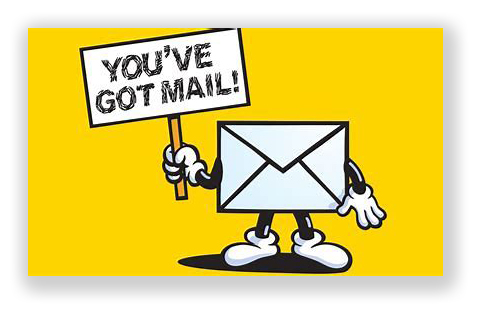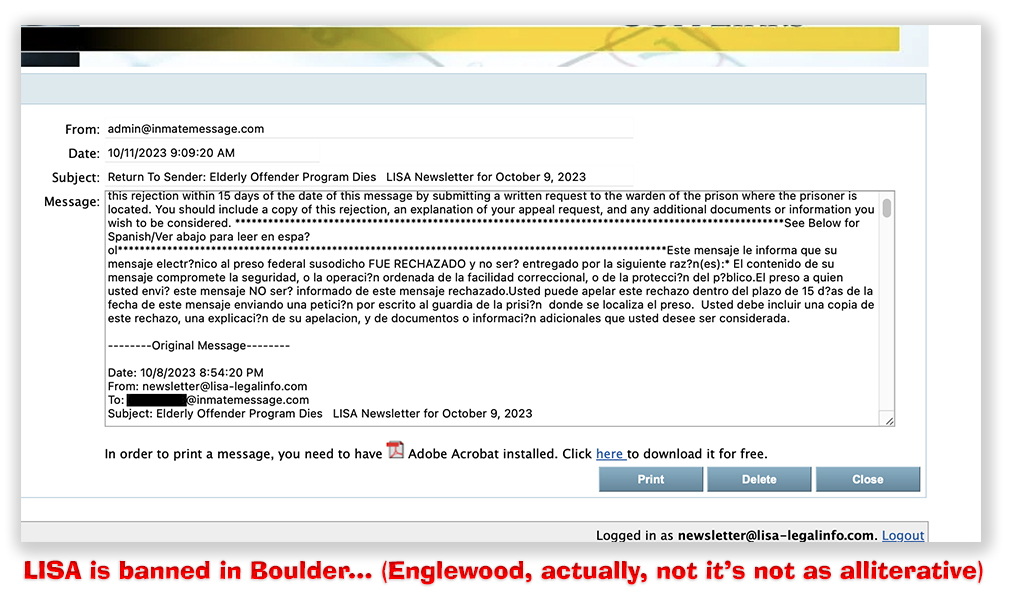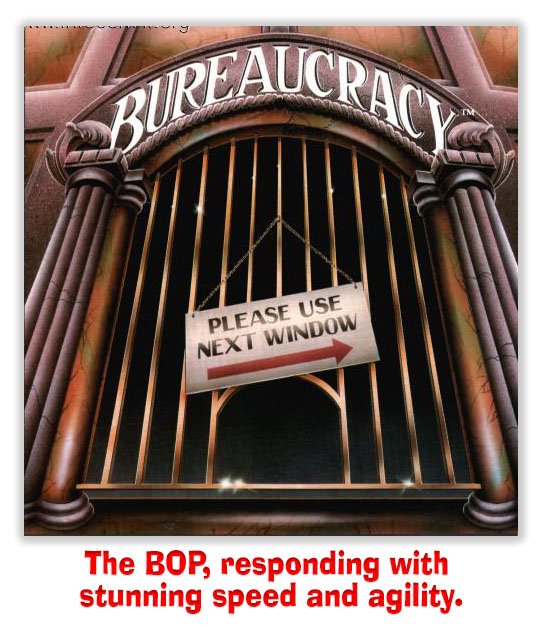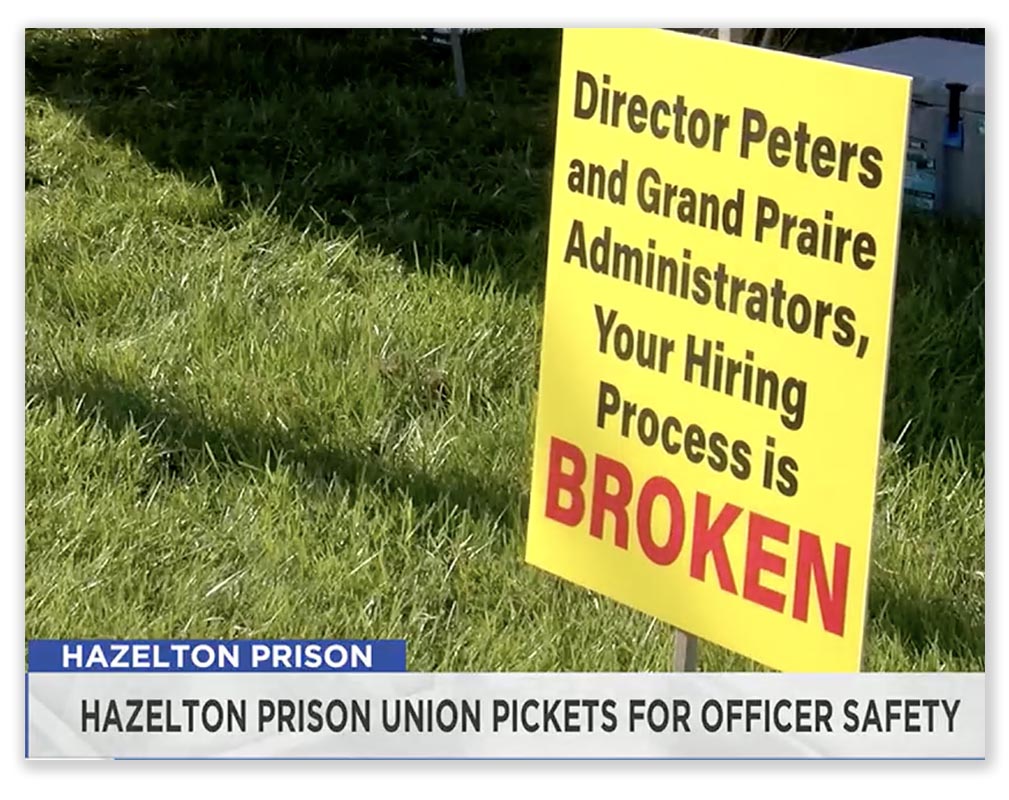We post news and comment on federal criminal justice issues, focused primarily on trial and post-conviction matters, legislative initiatives, and sentencing issues.

INSPECTOR GENERAL UNMASKS BOP-ACA INSPECTION SCAM
Adults in Custody (that’s “prisoners” in normal-speak and so far, the new label is about all the progress BOP Director Colette Peters has made in 17 months at the helm) are fortunate that the institutions in which they’re housed are regularly audited by the American Correctional Association to ensure that they continue to meet that organization’s uncompromising high standards.
 Of course. And the check’s in the mail, too…
Of course. And the check’s in the mail, too…
A report issued by the Dept of Justice Inspector General last month found that instead of providing an independent evaluation of Federal Bureau of Prisons facilities, the ACA “instead relied on the prisons’ own internal reports during reaccreditation reviews.” In other words, as the DOJ put it, “it appears the BOP is, in effect, paying ACA to affirm the BOP’s own findings.”
The BOP awarded a $2.75 million contract to the ACA in 2018 to obtain accreditation and reaccreditation for BOP facilities. Five years into the agreement, the DOJ audit was intended to evaluate “the value the BOP receives through ACA accreditation for its prisons” and “how the BOP uses ACA’s accreditation to improve BOP standards for health, safety, and security of inmates and staff; and (3) the BOP’s contract administration and ACA’s performance and compliance with terms, conditions, laws, and regulations applicable to the contract.
 The IG’s report found that “[a]lthough the contract requires ACA to perform its accreditation and reaccreditation in accordance with ACA’s policies, manuals, and procedures, current BOP and ACA officials… agreed that ACA would only perform independent reviews of BOP facilities as provided for in ACA policy during initial accreditation. For reaccreditation reviews, which was most of ACA’s work under the contract, the BOP and ACA agreed that ACA would rely on the BOP’s internal program review reports. As a result, it appears the BOP is, in effect, paying ACA to affirm the BOP’s own findings.”
The IG’s report found that “[a]lthough the contract requires ACA to perform its accreditation and reaccreditation in accordance with ACA’s policies, manuals, and procedures, current BOP and ACA officials… agreed that ACA would only perform independent reviews of BOP facilities as provided for in ACA policy during initial accreditation. For reaccreditation reviews, which was most of ACA’s work under the contract, the BOP and ACA agreed that ACA would rely on the BOP’s internal program review reports. As a result, it appears the BOP is, in effect, paying ACA to affirm the BOP’s own findings.”
The auditors also wrote they “did not identify instances where the BOP used ACA’s accreditation process to improve BOP standards for health, safety, and security of inmates and staff.” Of course not. If the BOP did a self-audit that the ACA signed off on, why bother to improve? Remember that only three months ago, NPR reported that the BOP claimed on its website that its medical centers were accredited by the Joint Commission, which accredits the vast majority of US hospitals, when in fact the certification had lapsed two years before.
NPR’s investigation – showing that federal prisoners die from treatable conditions that the BOP does not diagnose or treat in a timely way – was behind a call last week from Sens Richard Durbin (D-IL) and Charles Grassley (R-IA) for better BOP healthcare.
 “It is deeply upsetting that families are mourning the loss of their loved ones because they were not afforded the proper medical care they deserved while incarcerated,” Durbin, who is chairman of the Senate Judiciary Committee, told NPR. “BOP must immediately prioritize correcting the ineffective, harmful standards and procedures used to determine when an incarcerated person will be seen by medical professionals.”
“It is deeply upsetting that families are mourning the loss of their loved ones because they were not afforded the proper medical care they deserved while incarcerated,” Durbin, who is chairman of the Senate Judiciary Committee, told NPR. “BOP must immediately prioritize correcting the ineffective, harmful standards and procedures used to determine when an incarcerated person will be seen by medical professionals.”
Grassley, also a member of the Judiciary Committee, agreed. “BOP needs to be held responsible for this failure and take action to raise its standards.”
In response, a BOP spokesperson told NPR the Bureau “‘appreciates the Senators’ focus on this important issue’ and is committed to continue working with them on oversight.”
DOJ Office of Inspector General, Audit of the Federal Bureau of Prisons’ Contract Awarded to the American Correctional Association (November 16, 2023)
Lincoln, Nebraska, Journal-Star, Federal audit blasts nonprofit responsible for accrediting Nebraska’s prisons (December 10, 2023)
NPR, Lawmakers push for federal prison oversight after reports of inadequate medical care (December 12, 2023)
– Thomas L. Root





















 When Bureau of Prisons Director Colette Peters appeared for her first oversight hearing with the Senate Committee on the Judiciary about 51 weeks ago, it was an hour and a half on the Love Boat. But it’s now clear after the beating she suffered at the Committee’s hands two days ago that her ship is taking on water and the pumps can’t keep up.
When Bureau of Prisons Director Colette Peters appeared for her first oversight hearing with the Senate Committee on the Judiciary about 51 weeks ago, it was an hour and a half on the Love Boat. But it’s now clear after the beating she suffered at the Committee’s hands two days ago that her ship is taking on water and the pumps can’t keep up.




